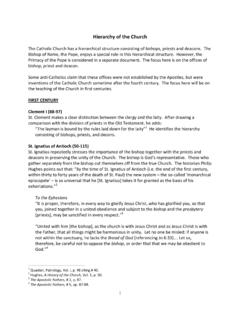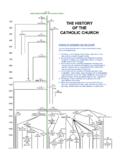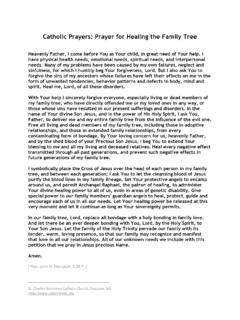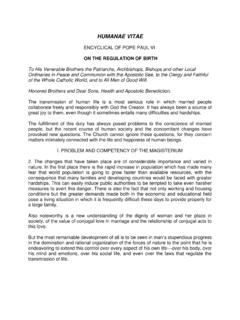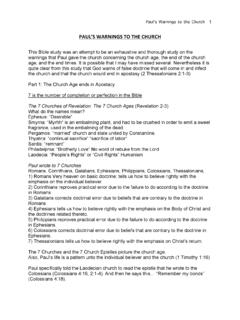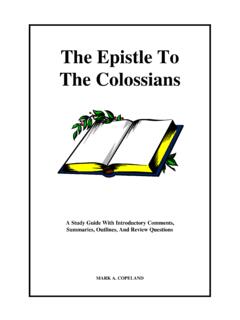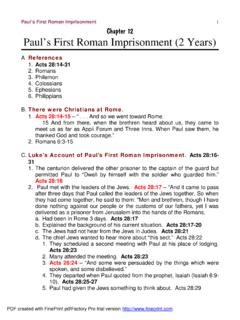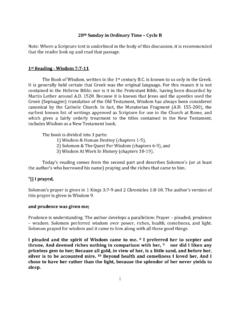Transcription of Why do Catholics confess their sins to a priest?
1 1 Why do Catholics confess their sins to a priest? Confession is a sacrament instituted by Jesus Christ providing a means for those who fall into sin after Baptism to be restored into God's grace. It involves the admission of one's sins made to a duly approved Priest in order to obtain absolution. Confession is called the "sacrament of Penance" as: the recipient must be truly repentant of his sins , be determined to try to avoid this sin in the future, and be willing to make reparations as appropriate with any/all injured parties. Only God can forgive sin.
2 The sacrament of Penance is the way which God has chosen to administer that forgiveness. Jesus exercised the power to forgive sins "that you may know that the Son of man has authority on earth to forgive sins " (Mt 8:6). And Jesus to the Apostles in Jn 20:21-23 reads: ".. As the Father has sent Me, so I send you. And when He had said this, He breathed on them and said to them: 'Receive the Holy Spirit. Whose sins you forgive are forgiven them, and whose sins you retain are retained." Note that this power bestowed upon the Apostles is different than the power previously given Peter of binding and loosing, which is the broad power in matters of faith and morals; this power is specific to sin.
3 Knowing that the Apostles, mere men, were incapable of handling such a responsibility on their own power, Jesus Christ gave them a special communication with the Holy Spirit (pneuma) for this special work. In all of the Bible, there are only two instances where God breathed on man, the other was when He gave man a living soul in Gen 2:7 - thus emphasizing the importance of the sacrament of Penance. And as this power was bestowed upon the Apostles, it was to be inherited by their successors, continuing His presence throughout time (Mt 28:19-20). Yes, Jesus is the one Mediator, but that does not deny Him from choosing others to assist Him in his work.
4 The Apostles certainly understood what Jesus Christ had commissioned them to do. Paul, in the name of Jesus, exercised the power of binding and loosing from sin and the effects of sin in the case of the incestuous Corinthian. In 1 Cor 3, Paul says: "I have already judged him that hath done so"; and in 2 Cor 2:10, Paul justifies his forgiveness of the repentant man by saying "If I have pardoned anything, I have done it in the person of Christ". Further, in 2 Cor 5:18, Paul writes: "All this is from God, who through Christ reconciled us to himself and gave us the ministry of reconciliation".
5 And in 2 Cor 5:20, Paul confirms "So we are ambassadors for Christ." One Mediator redeemed us, Jesus Christ. The catholic Priest, in the sacrament of Penance, does not redeem us; he is but an agent of the one Mediator, assigned and empowered by the one Mediator. Confession is but one way of applying the mediation of Christ to men - Baptism is another. A prominent protestant 2 televangelist, arguing against the sacrament of Penance, used Acts 10 and Acts 16 as proof text, pointing out that Peter did not give absolution to Cornelius and Paul did not give absolution to the Philippian jailer.
6 This is true; however, not for the reasoning implied. Both Cornelius and the jailer were being baptized, and confession is not necessary for Baptism since Baptism in itself forgives sin (original sin and any other sin personally committed before the Baptism). Why not confess your sins directly to God in prayer? By sin, it was God that was offended; and God set down the conditions for forgiveness. You cannot insist of God that He forgive your sins on your own conditions. And Jesus Christ did not bestow the power and responsibility to forgive sins to the Apostles and their successors knowing that all one needed to do was to seek forgiveness through prayer.
7 The Church does not deny that sins will be forgiven via prayer directly to God, given of course that there's true repentance coupled with firm resolution to avoid this sin in the future; however, the only way we can be sure of proper disposition of the forgiveness of sin with absolute certainty is via the means established by Christ - the sacrament of Penance. Do Catholics sin because they know they can get absolution in Confession? That's as silly as asking: Would you break your leg knowing that a doctor could heal it? Besides, the sacrament of Penance does not give permission to commit the same sin again, and if the penitent has the intention of doing so, the absolution is null and void.
8 Did catholic priests invent Confession (and Purgatory for that matter) in order to obtain money? No money is ever paid for absolution; further, it would be mortal sin for a priest to suggest or demand payment for absolution. It is indeed customary to give a priest a small stipend for celebrating a memorial Mass. The usual/customary amount is five dollars, though there is no obligation to give anything, and many people, out of poverty or ignorance, give nothing. As far as the Bible is concerned, it's entirely reasonable for a priest to receive some small stipend for guest preaching, baptisms, weddings, and other ministerial functions.
9 Paul said, "Let the presbyters [priests] who rule well be considered worthy of double honor, especially those who labor in preaching and teaching; for the scripture says, 'You shall not muzzle an ox when it is treading out the grain,' and, 'The laborer deserves his wages'" (1 Tim 5:17-18; cf. Mt 10:10, Lk 10:7). Some protestants mistakenly believe that the Fourth Lateran Council, in 1215 AD, invented auricular (heard by a human) confession. In reality, the Fourth Lateran Council mandated annual confession for all Catholics - oral confession heard by priests existed from the start of the Church.
10 3 Until the Reformation, all Christians went to Confession. What did the Early Fathers believe and practice? The Didache - " confess your sins in Church, and do not go up to your prayer with an evil conscience. This is the way of life.. On the Lord's Day gather together, break bread, and give thanks, after confessing your transgressions so that your sacrifice may be pure" (Didache 4:14, 14:1 [AD 70]). The Letter of Barnabas - "You shall judge righteously. You shall not make a schism, but you shall pacify those that contend by bringing them together.
